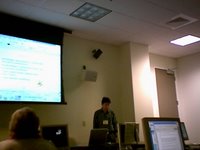skip to main |
skip to sidebar

I'm an "official" LITA blogger now! My piece on this somewhat stormy session is on the LITA blog site.
 Friday's second session of the Open Source Installfest found Amy De Groff and Luis Salazar of the Howard County Library in Maryland presenting the story of the migration of their 270 public pcs to the Linux distro Groovix.
Friday's second session of the Open Source Installfest found Amy De Groff and Luis Salazar of the Howard County Library in Maryland presenting the story of the migration of their 270 public pcs to the Linux distro Groovix.
Although the name suggests visions of love beads and lava lamps, this is a modern, mainstream Linux based on Ubuntu and supported by the company Open Sense Solutions. Similar to the perhaps better known Canadian company Userful, Open Sense allows customers to leverage the power of Linux by creating multiuser clusters with multiple keyboards, video displays and mice sharing a single PC.
Howard County Library had initially migrated to Linux two years ago with a custom distro they called LuMix, after the first initials of the two members of their IT staff who created it. Offering patrons (or as they preferred to call them, customers) a Gnome desktop and a collection of open source applications, the library elected to continue along this path this year, but chose to go with a vendor-based solution to save staff time and resources.
The key to public acceptance of a non-Microsoft environment seems to be aggressive promotion of the cost advantages of open source, plus a consistent emphasis on working the problems as they occurred until a solution could be found. For example, when open source pdf programs did not support the forms features required by IRS tax forms, the library added the proprietary Adobe Acrobat to its systems. When a subscription database did not support the Firefox browser, it was found that Opera could handle the site, and it was added to patron systems.
Attendees were given LiveCDs of the distro to use during the session, booting the otherwise Windows pcs in the Nashville Public Library's computer lab into Groovix (and given the discs to take home and play with).
The session concluded with a discussion other open source programs of interest to libraries, including the Georgia PINES Evergreen open source library automation system, and several attendees expressed the desire to learn more about it, perhaps by visiting Georgia.
Although not exactly an "installfest" in the classic sense, this two-day preconference was both enjoyable and informative.
 This preconference session was held in a computer lab in the beautiful Nashville Public Library. Gary Wan, Texas A&M University Library presented an introduction to what are arguably the crown jewels in the open source library software world: the Koha integrated library automation system, the Greenstone digital library system, the Swish-e indexer, and the Wordpress blogging software.
This preconference session was held in a computer lab in the beautiful Nashville Public Library. Gary Wan, Texas A&M University Library presented an introduction to what are arguably the crown jewels in the open source library software world: the Koha integrated library automation system, the Greenstone digital library system, the Swish-e indexer, and the Wordpress blogging software.
Beginning with an introduction to the concepts of open source software, Gary proceeded to describe in some detail the ins and outs of a typical Koha install, and invited attendees to connect via the web interface to a test installation of Koha on his laptop. While it was a great idea to offer a live test system to play with, there was little data in the test system, which limited what users could do. Perhaps to keep things simple, the pages on the test system had not been customized and did not show the current state of Koha design (for that see the opac of the West Liberty Public Library ). And none of the wonders promised with Koha 3.0 were mentioned. Still, a good, and uncomplicated introduction.
Greenstone was also described in some detail, and illustrated with a test install made accessible to attendees. Gary gave a little more attention to installing on Windows this time (he had wisely warned against trying the notoriously problematic Koha for Windows), but as Greenstone works fine on Windows, it was given equal time. Again, a good introduction that could have been more interesting with more data and flashier examples (like this).
Swish-e seems a humble program by comparison to Koha and Greenstone, yet Gary showed how it could play an important role in small web sites by providing a fast, simple indexer. And Wordpress was described briefly also. But to be honest, by this time in the proceedings my mind was straying to the promised trays of cookies awaiting us in another room, so I welcomed the brevity. "Installfest: come for the Koha, stay for the cookies!"
After Gary wrapped up with a perfunctory mention of a few other tools (Prospero, OpenILL, OpenAAQ and Jybe), which seemed better left to the "for more information" handout, Amy DeGroff and Luis Salazar of the Howard County Library introduced themselves and promised great things (and a free disc!) tomorrow in the second session when they will describe their pioneering work bringing open source to their library.
Tune in tomorrow, same bat time, same bat channel, er... blog.
 I'm here in rainy Nashville for the LITA National Forum. While I'm waiting for things to get started, I'm in the hotel lobby reflecting on an exhausting cross-country flight highlighted by having my toothpaste confiscated by Federal agents. What interesting times.
I'm here in rainy Nashville for the LITA National Forum. While I'm waiting for things to get started, I'm in the hotel lobby reflecting on an exhausting cross-country flight highlighted by having my toothpaste confiscated by Federal agents. What interesting times.
I noticed for the first time the spread of airport shops selling CDs and DVDs. Although the fate of Tower Records shows how format tastes are changing, the demand for physical media is alive and well in some niche markets, such as air travelers. (At least until in-flight Internet access catches on-- how could that "Connexion by Boeing" system have failed in the market? Possibly they were driven out by fear of what OCLC would do over the name conflict?)
Well, forum registration is in an hour, I'd better go get something to eat now. More later.
 Well, just as we were worrying that the coup in Thailand would slow down the OLPC project's drive to reach a critical mass of orders, Libya signs on with an order for 1.2 million units.
Well, just as we were worrying that the coup in Thailand would slow down the OLPC project's drive to reach a critical mass of orders, Libya signs on with an order for 1.2 million units.
I'm reminded of the comment by Apollo 13 astronaut (or at least Tom Hanks playing Jim Lowell) that, "You never know what events are going to transpire to get you home."

On Sunday the BBC ran a story (first in a series) documenting how risky it is to run MS Windows on a computer connected to the Internet.
Simulating an unprotected MS Windows Home machine being connected to the Internet, BBC researchers found it was hit by a potential security threat within seconds, with assaults of one kind on another coming an average of every 15 minutes, and with serious hijack attempts coming every hour or so, from machines as far away as China. They ask:
"If every hour a burglar turned up at your house and rattled the locks on the doors and windows to see if he could get in, you might consider moving to a safer neighbourhood."
Of course, we now take for granted the need to add layers of security programs, and constantly monitor MS Windows computers in our Internet labs for security breaches.
Libraries continue to use Windows computers in labs because patrons are familiar with them and we often have to follow computer policies drafted by IT groups more in tune with the needs of office workers. But Linux is safer by design, and far easier to lock down than MS Windows (Vista or beyond) will ever be.
For years now it has been obvious that diskless computers running LiveCD Linux distros provide the safest and easiest to maintain Internet lab setup.
The new mantra is "The customer is not broken", but it doesn't mean the customer is always right. Sometimes they just don't know what's out there. We wouldn't hesitate to offer a patron a better, more reliable reference source than one they asked for by name. How is that different from offering a better, more reliable public computing platform?


 Friday's second session of the Open Source Installfest found Amy De Groff and Luis Salazar of the Howard County Library in Maryland presenting the story of the migration of their 270 public pcs to the Linux distro Groovix.
Friday's second session of the Open Source Installfest found Amy De Groff and Luis Salazar of the Howard County Library in Maryland presenting the story of the migration of their 270 public pcs to the Linux distro Groovix. This preconference session was held in a computer lab in the beautiful Nashville Public Library. Gary Wan, Texas A&M University Library presented an introduction to what are arguably the crown jewels in the open source library software world: the Koha integrated library automation system, the Greenstone digital library system, the Swish-e indexer, and the Wordpress blogging software.
This preconference session was held in a computer lab in the beautiful Nashville Public Library. Gary Wan, Texas A&M University Library presented an introduction to what are arguably the crown jewels in the open source library software world: the Koha integrated library automation system, the Greenstone digital library system, the Swish-e indexer, and the Wordpress blogging software.

 Well, just as we were worrying that the coup in Thailand would slow down the OLPC project's drive to reach a critical mass of orders, Libya signs on with an order for 1.2 million units.
Well, just as we were worrying that the coup in Thailand would slow down the OLPC project's drive to reach a critical mass of orders, Libya signs on with an order for 1.2 million units.
